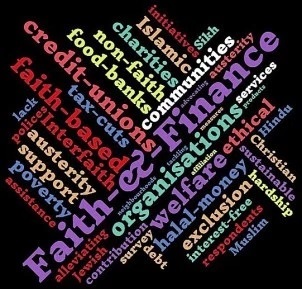In an environment where financial exclusion is increasing, the contribution of faith organisations from across faith traditions in ‘plugging the gap’ is often overlooked according to new research by the Centre for the Study of Ethnicity and Citizenship at the University of Bristol, Public Faith and Finance: Faith responses to the financial crisis’. The report found that a cross section of faith organisations are mobilising to provide welfare advice and resources such as food aid, grants and providing or signposting to debt advice and ethical lending services. Others are working to raise awareness of the impact of welfare cuts, or leading campaigns to reform financial services.
A recent report by New Philanthropy Capital (NPC) documented more than 43,000 faith-based registered charities in Great Britain including multi-faith, Sikh, Jewish, Muslim, Christian, Quaker and Buddhist charities. It goes without saying that the reach and capacity of these groups to engage in social justice varies hugely, a factor also explored by the University of Bristol report, which surveyed the work of a cross-section of 90 faith organisations and carried out thirteen case studies of faith-based initiatives. It found that faith organisations were assisting those suffering from financial hardship, engaging in campaigning and lobbying for the reform of financial products and services, and promoting or providing alternatives to market-based finance to varying degrees.
The University of Bristol report also found that:
- Different faith groups collaborate successfully to provide welfare advice, to campaign and lobby on, and challenge welfare and public spending cuts, and to develop and promote more ethical approaches to finance;
- Faith and secular organisations mobilise faith and ethical values to collaboratively develop innovative approaches to creating more just and sustainable forms of finance;
- Although there are organisational and capacity differences, across faith groups there is motivation and drive to provide welfare advice, support, and financial help in holistic ways;
- Some faith organisations felt they needed more support and guidance on governance, financial transparency and how to comply with charity regulations. The research found this to be a particular challenge for some Muslim charities which, because of negative publicity and a perception that they are ‘under the spotlight’ fear reputational damage;
- The provision of assistance by faith groups cut across faiths and tended to be provided regardless of religious affiliation.
The report makes a number of recommendations including the need for faith groups to share learning around welfare and finance issues and the different ways in which they address these at a community level with other faith groups, secular organisations and local authorities. It also highlights the role faith leaders can play in building dialogue with financial institutions and strengthening networks and collaboration with other faith groups, non-faith groups, social enterprises and ethical finance providers. It also calls for all stakeholders to consider how to better support faith organisations to strengthen governance and their ability to meet statutory requirements.

